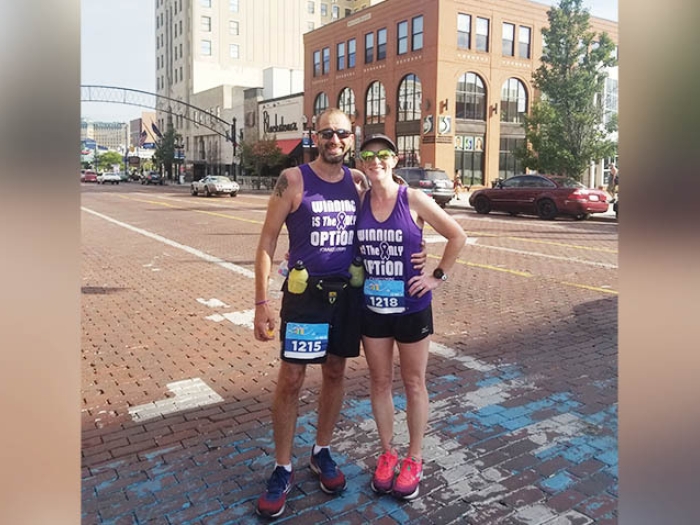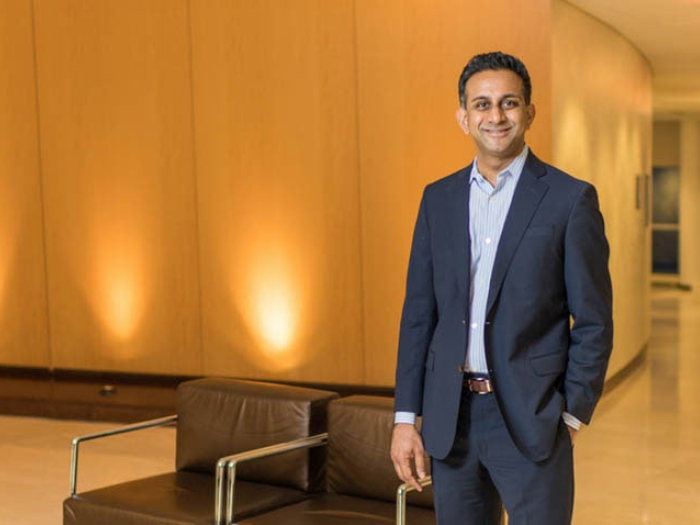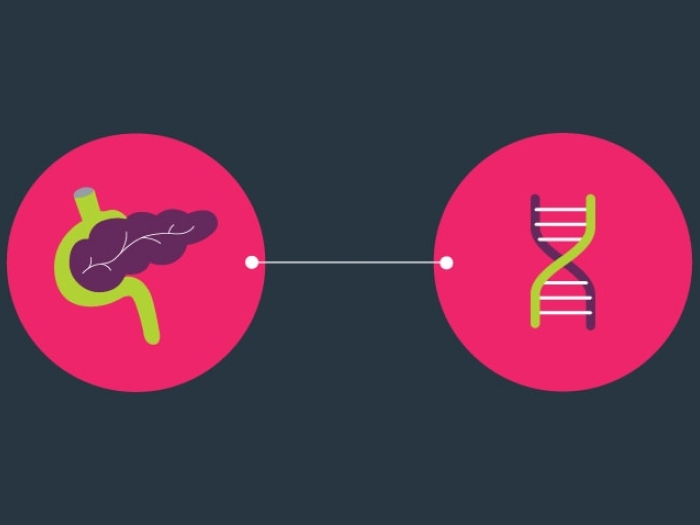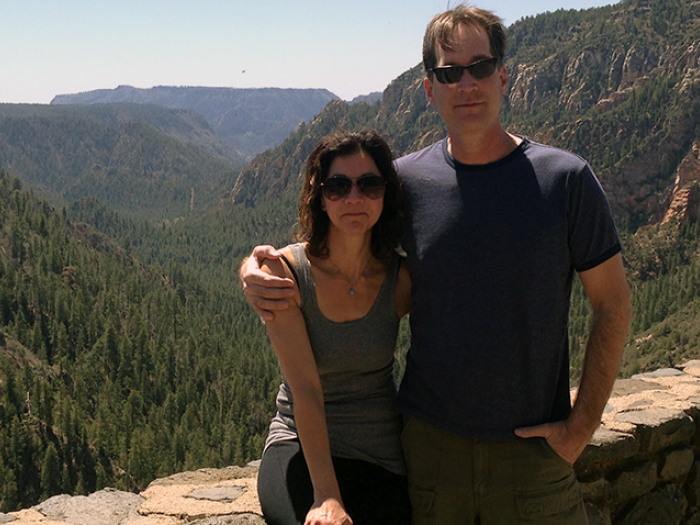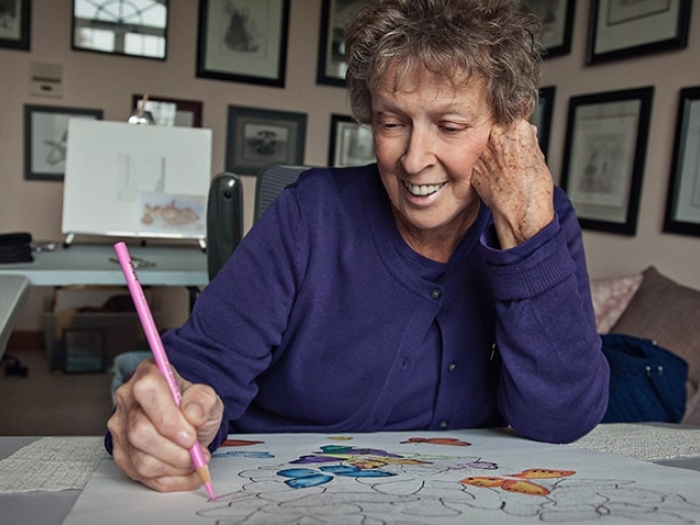A patient’s journey from Arizona to the University of Michigan Rogel Cancer Center to participate in clinical research led to the successful removal of her cancerous tumor.
9:29 AM
Author |
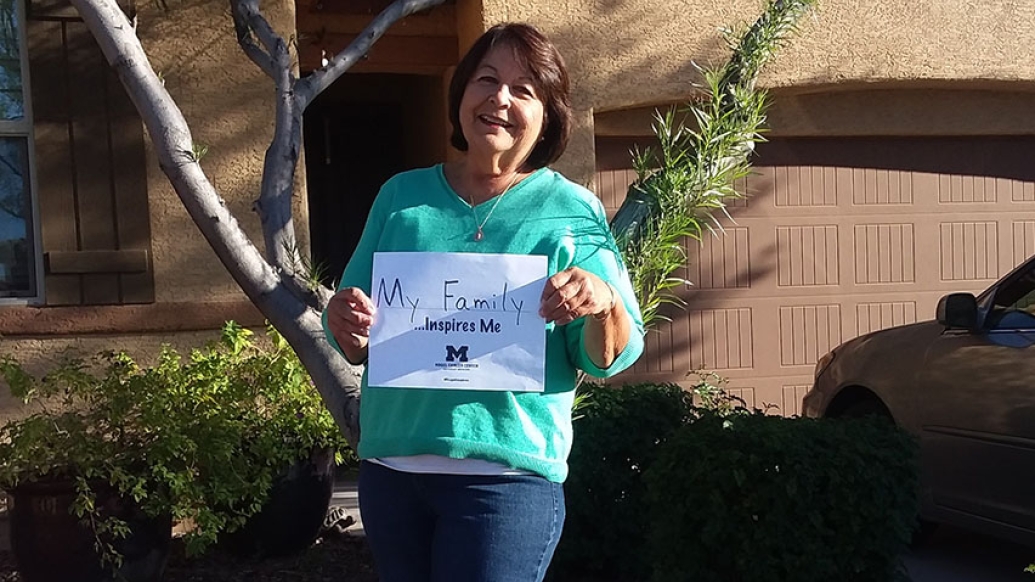
When Rachel Moreno was diagnosed with pancreatic cancer in March 2015, the 68-year-old professor and grandmother of five quickly grew weary of health professionals asking how she felt about it. She was not interested in talking about her feelings. She wanted to know what options were available to treat her cancer.
"I immediately went online, as did my son, to read about pancreatic cancer," Moreno says. Though advancements are being made in treatment for the disease, survival rates are low and it is considered incurable in cases when surgery is not possible and the disease spreads to other areas of the body. In 2018, the average survival for advanced disease is a little less than one year.
Within a month, Moreno relocated from her home in Tucson, Arizona, to Grand Rapids, Michigan, to live with her son and his family, who could help her through treatment. She had cared for a relative with cancer in the past and knew how taxing it could be.
The cross-country move led her to the University of Michigan Rogel Cancer Center where she opted to join a clinical trial studying a new way to treat pancreatic cancer.
"I remember thinking that if the trial didn't help me, the results might help someone else," Moreno says.
Suddenly, life as she knew it went on hold. Saving her life took center stage.
Diagnosis unexpected
Moreno had no symptoms prior to her pancreatic cancer diagnosis, but ended up in the emergency room following a car accident one morning while driving to pick up her grandkids for school. Doctors found cancer when she received MRI and CT scans for her injured back.
"My cancer diagnosis was a complete shock and surprise," says Moreno. She had been busy with her career, which involved traveling to supervise and mentor teachers across the United States. She also had two grown children and spent time with her grandchildren, volunteering at their schools and watching sporting events.
Normal cells have two ways to protect themselves from DNA damage caused by chemoradiation, but pancreas cells have only one way.Theodore Lawrence, M.D., Ph.D.
The mass detected on her pancreas turned out to be pancreatic ductal adenocarcinoma. The cancer appeared to be localized, or in other words, it had not spread. But still, surgery was not possible. The tumor on her pancreas involved the artery that brought blood to her liver. And the tumor came in contact with important veins carrying blood from the intestines to the liver.
Her oncologist at the Rogel Cancer Center, Mark Zalupski, M.D., introduced Moreno to a new research protocol to treat the tumor with a combination of chemotherapy and radiation therapy. If treatment could shrink the tumor and keep the disease from spreading, it might allow the tumor to be safely removed.
Much depended on whether Moreno's cancer responded. She agreed to join the clinical trial.
Goals of the clinical trial
The trial involved adding an oral agent known as AZD 1775 to chemotherapy and radiation. In laboratory studies, it did a better job killing pancreatic cancer cells.
LISTEN UP: Add the new Michigan Medicine News Break to your Alexa-enabled device, or subscribe to our daily audio updates on iTunes, Google Play and Stitcher.
"Normal cells have two ways to protect themselves from DNA damage caused by chemoradiation, but pancreas cells have only one way," says Theodore Lawrence, M.D., Ph.D., chair of radiation oncology at Michigan Medicine. Lawrence's lab conducted the laboratory research, and he was leading the clinical trial.
"In preclinical studies, AZD 1775 canceled that one remaining protection that cancer cells have, causing the pancreatic cancer cells to die. Normal cells remained relatively unaffected in this model," he says.
The research study was for patients exactly like Moreno, whose pancreatic cancer is extending locally beyond the pancreas, but not to other parts of the body, and whose tumors could not be removed surgically.
"Dr. Z. and Dr. Lawrence explained that the clinical trial would begin with 25 radiation treatments," she says. "My chemotherapy began shortly after finishing my radiation and lasted three months or so."
The goals of the combined approach were to provide treatment throughout her entire system, as well as directly targeting the tumor on her pancreas. If her tumor shrank and the cancer did not progress in the approximately six months of treatment, they'd evaluate whether her tumor could be safely removed.
MORE FROM THE LAB: Subscribe to our weekly newsletter
Enduring difficult side effects
During cancer treatment, Moreno experienced challenging side effects and was grateful for the support of her family, especially her daughter-in-law, Patty, who was a primary caregiver. Moreno was glad she had acquiesced and made the move to Michigan.
Though she experienced fatigue, nausea and high fevers, she continued working during chemotherapy and scheduled treatments to have recuperation time over the weekend in order to be at work on Monday. When that wasn't possible, Patty helped with preparing healthy meals, offering cold compresses on her forehead and providing emotional support.
Her granddaughters were also a source of support and entertainment.
"My challenge was not knowing how I would feel on Monday when I had teachers waiting to be evaluated," Moreno says. "I traveled to different states for my job. It was a challenge not to be 100 percent focused on my job throughout my treatment."
Moreno met periodically with Lawrence during radiation and with Zalupski throughout her treatment. Each time she had an infusion, she also took a pill containing the agent being studied.
"I have never been to a medical facility where each doctor makes sure the patient can reach him or her. I still have Dr. Lawrence's cell phone number. All my team made certain I knew what was happening at each stage of my treatment," she says.
When treatment ended, she had scans and returned home to wait for the results.
Receiving the good news
Moreno received the news in December 2015, when Zalupski called to report that her cancer had responded to treatment. It had not spread and the tumor on her pancreas had shrunk enough to be safely removed.
Surgery was scheduled for February 2016 with Hari Nathan, M.D., Ph.D. Scans following surgery have shown no evidence of disease. She is currently cancer free.
"We are delighted and encouraged with the outcome of care and treatment for Ms. Moreno," Zalupski says. "Her courage and steadfastness in accepting a difficult diagnosis and willingness to experience chemotherapy and radiation is admirable and shared by many of our patients and families. I believe, too, her participation in a clinical trial was helpful to her and to the greater community of those affected by cancer."
Moreno, now 71, has since retired and moved back to her hometown of Tucson. She continues spending time with her grandchildren, reading, walking her 14-year-old dog and hosting a monthly potluck for a group of seniors who walk together in the neighborhood.
She could receive follow up care in Tucson, but chooses to return to the Rogel Cancer Center every six months for scans.
"I am a Victor and will continue to be a Victor," she says. "The Rogel Cancer Center is unique in that every single person I came in contact with during my treatment was someone who would provide directions if I was lost, a smile when I needed one and genuine concern for a fellow human being. Even the person who pushed my wheelchair was kind and caring."

Explore a variety of healthcare news & stories by visiting the Health Lab home page for more articles.

Department of Communication at Michigan Medicine
Want top health & research news weekly? Sign up for Health Lab’s newsletters today!
